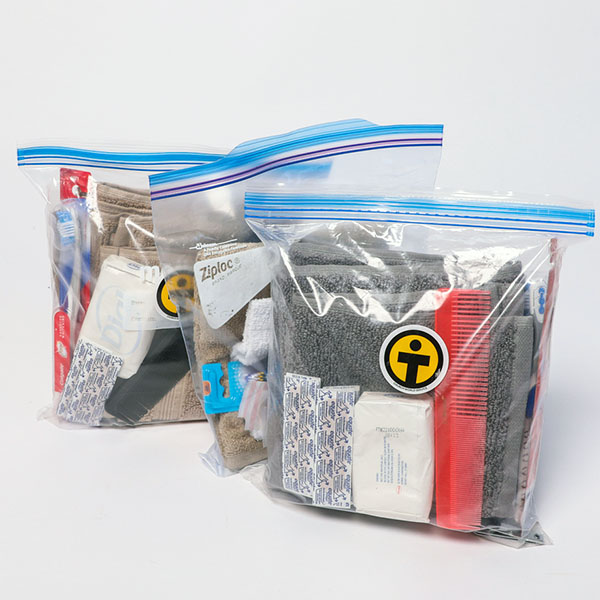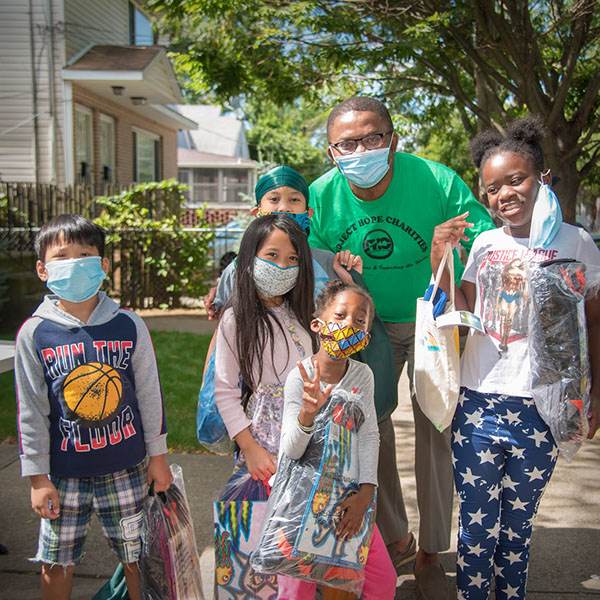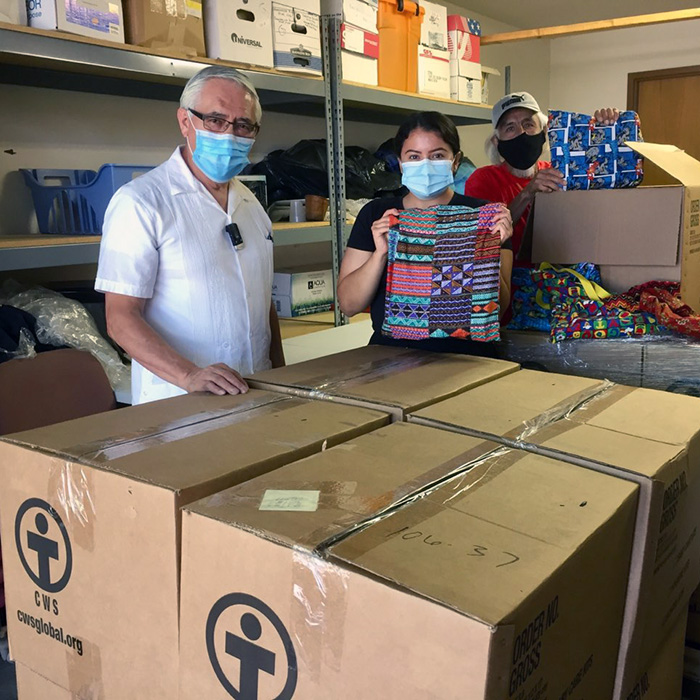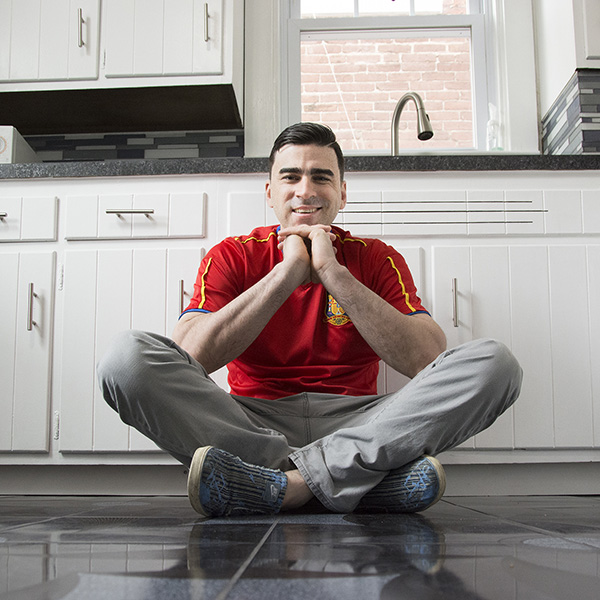Six years ago, local farmer Jim Mumaw and his daughters Holly and Katherine started mentoring a group of refugee youth including Robel and Mickey. The Mumaws taught them how to raise sheep and show them at the Rockingham County Fair. When Mickey’s family came to the United States as refugees from northern Ethiopia, they were looking for local places to …
Stories of Change
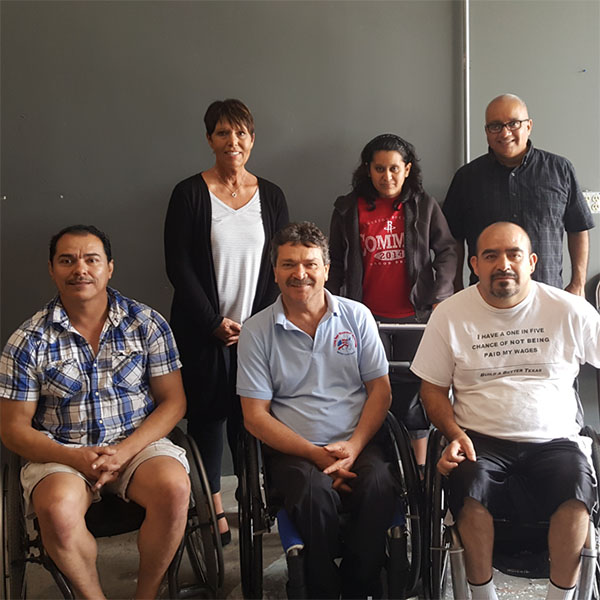
CWS Emergency Response Specialist Susanne Gilmore (back row, left) with staff from Living Hope Wheelchair Association in Houston.
Relief in the Face of a “Tsunami of Need”
Imagine being an undocumented worker in Texas. One day, a nightmare happens: you’re injured at work, and you end up relying on a wheelchair. Your body was your tool. It’s what made you a good worker in that sector, and it’s how you provided for your family. In just a few seconds, your ability to use that tool changes dramatically.
Now, it seems like no one wants to hire you. Because you’re undocumented, you don’t quality for unemployment or other benefits. It feels like no one wants to help you. Bills are piling up, and you start facing tough decisions about whether to pay your rent or buy food.
This is a dark story. It’s one of isolation, loneliness and despair. But it can also be a story of hope–one of neighbors standing together in the face of adversity.
And it’s one that the team at Living Hope Wheelchair Association in Houston knows very well.
Living Hope works with undocumented people with disabilities and their families. Much of their work focuses on helping people access durable medical equipment, essential supplies and medical care. Their team distributes adult diapers and catheters, and they help members access paratransit or other transportation to get to dialysis or other appointments. In addition to these material needs, Living Hope advocates for fairer, more equitable policies in healthcare and transportation. They also reach out to help break the isolation that many of their members face. They do regular calls to check in about their needs, including emotional and spiritual ones. Since Living Hope leaders themselves have faced the isolation and abandonment from society, they know that this accompaniment is a crucial part of their work. They leave no one behind.
Most of Living Hope’s clients are undocumented. Without a safety net, these families are especially vulnerable when something unexpected happens.
We first got to know Living Hope after Hurricane Harvey hit Houston in 2017. As you can imagine, disasters are even tougher to navigate for people with disabilities. With Harvey’s widespread flooding, some of Living Hope’s members were physically stuck in their damaged homes. CWS provided funds to help them build wheelchair ramps.
From there, a partnership was born. Tomás Aguilar, the Disaster Recovery Coordinator at Living Hope, has worked closely with CWS for the last three years. “CWS has amazing work happening, and amazing support. I take advantage of that,” he says. “By the time COVID-19 hit, we knew how to shift gears and do more with less. The discussions, emails and materials that CWS shares really made an impact on our ability to provide the same level of service.”
Still, the team at Living Hope has paid a price. Leaders within the organization contracted COVID-19. The team has been working above and beyond their usual hours and job descriptions. “We are proud we are serving our community and we will be even prouder when we can do it in a way that doesn’t overwhelm us,” Tomás says. “There will come a day, thanks to our planning and improvement in capacity, where we will not only keep our mission going no matter what but we will do it without overworking ourselves!”
It was after one of the CWS-convened group discussions with partners that the CWS team reached out to Tomás this spring. We asked what new needs Tomás was seeing in his community and how we could help.
Sadly, Tomás had a lot to share. Because of their immigration status, Living Hope’s members weren’t eligible for stimulus payments or the expanded unemployment benefits. In this political culture, people are afraid. They aren’t sure how to get through losing family members to COVID-19, losing jobs and facing mounting bills. Even the informal economy has dried up. The pandemic shut down paratransit services for a while; when they started up again, people were scared to leave home. “If families were hurting before, it has gotten worse,” Tomás says. Families are rationing insulin, medicine and food. Tomás called it a “tsunami of need.”
CWS issued a $15,000 grant to help. It’s part of a fund that Living Hope is using to provide cash help to at least 200 families. Each family has their own list of needs, and they know what is most urgent for them. It may be rent or a utility bill that is overdue. It might be food for families on the brink of starvation. And in some heartbreaking cases, it’s funeral expenses for a loved one who has died of COVID-19. Living Hope talks to each family, and those with extraordinary needs may receive a little extra help. The team’s goal is to eventually be able to provide at least $500 to each family to help during these dark times.
Every single one of us has been impacted by the coronavirus pandemic. But for our neighbors who have no support to fall back on, it has been catastrophic. Our team is proud to support Living Hope as they provide relief and hope to hundreds of people who are facing some of their darkest days. Because when it really comes down to it, that’s what neighbors do.

